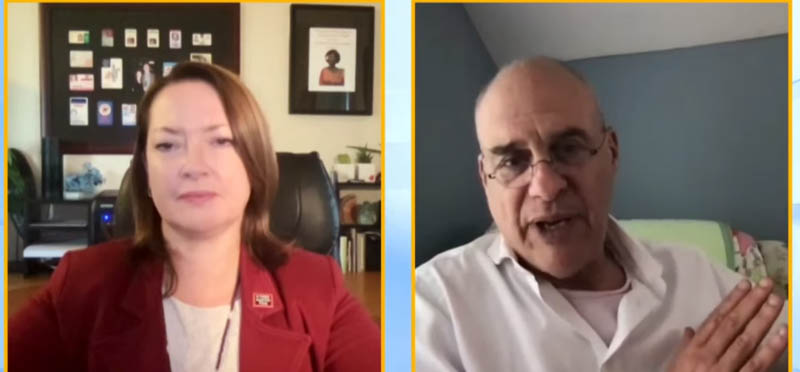Bittman: Lack of affordable quality food is a public health crisis
For years, Mark Bittman has been famously writing about how to buy and cook all manner of food. Yet his latest book, “Animal, Vegetable, Junk: A History of Food from Sustainable to Suicidal,” delivered several stark messages that he discussed during a May 13 National Press Club Headliners event.
Bittman kicked off the discussion by speaking about the five-year evolutionary process of writing his book and the subject focus that kept rising to the top.
“It just became increasingly clear that there were increasing problems with our food system with the food we were growing and processing and buying and how we were doing it and how it was affecting our bodies, and how it increasingly became clear how much impact agriculture had on climate change,” he said in an interview with Club Treasurer Eileen Drage O’Reilly.

One of the central problems with the food system he cited was a world of haves versus have-nots when it comes to processed food as a source of poor health.
“We should be making nutritious food that’s available and affordable to everybody," said Bittman, a food writer and former New York Times columnist. "That’s not how the food system on the United States and many other places in the world, works. The way it works here, its priority is to make money. “
Bittman later detailed his case about how a lack of quality food affordability and inefficient natural resource management leads to poor health and bad environment. For example, he spoke of how low wage workers who work on and live near factory farms often don’t have access to good food and healthy environments.
“The way the food system is organized again without much concern for sustainability, for the future for resource use, for the way the planet might look in ten or fifty years," he said. "Again the parallels to climate change are right there. The way it works and the problems that it causes affect everybody. But those problems don’t affect everybody proportionately. They affect people who live in farming communities who work in farming communities. [Those]who live near farming communities who don’t have the money to buy good food, who don’t have time to prepare that good food. They affect those people more. So they can affect you in the sense that if you live near a factory farm, the odds of getting cancer increase significantly.”
Bittman went on the chastise how the United States does not helps those who live here when it comes to quality food security.
“But given that we’re the richest country in the world, one could question why 50 million people are in need of supplemental nutrition assistance and why there’s another 20 or 30 million who would qualify," he said. "But who, for issues of pride or dignity or ignorance, that is, they don’t know the program exists, or how to apply for it. Another 20 or 30 million should be on that program and are not. But its a question that goes way beyond food when you start to say how can we have so many citizens—a quarter or a sixth of our citizens—who can’t afford the basic necessities of life.”
One solution for quality food Bittman offers, is that we can get back to quality food by moving towards a natural way of farming instead of commercial methods, which he says disrupts the environment.
“What looks like chaos is how nature works [and grow]best with many different species competing and supporting one another with biodiversity with many different life forms in the same place," Bittman said. "That’s the way soil is kept alive. That’s the way water use is minimized. That’s the way things grows best.”
Looking at government-based strategies, Bittman was asked about current U.S. Agriculture Secretary Tom Vilsack, who appeared at a March 26 Club Virtual Headliners event. Bittman criticized Vilsack's first tour of duty in the job under President Obama, calling him "terrible."
But he gave Vilsack modest credit for trying to make up for lost opportunities from his last stint.
“He’s recognizing that agriculture’s impact is enormously profound and in many ways destructive…Vilsack is at least giving lip service to the problem,” Bittman said.
Bittman also suggested that the United States rethink the notion of priorities when it comes to food production and consumption, citing how the government had the will to produce back-to -back trillion dollar legislative COVID-19 relief packages.
“It would be interesting to see what would happen if we could define the public health problems that were having as a result of agriculture and diet right now as a crisis and try to address them so that nutritious food for all became a priority in this country,” Bittman said.
